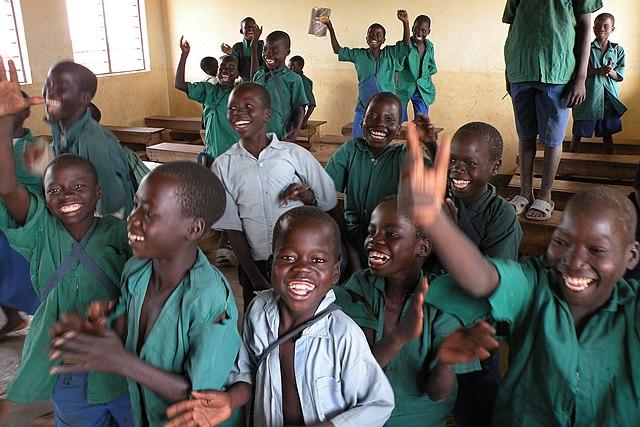African Students Take Radical Approach To Pro-Abortion Campaigners
The U.S. government spends millions on condoms and promoting abortion instead of hygiene and potable water for Africans.

African students took a radical approach to thwart Planned Parenthood International’s efforts to promote contraception and abortion to children.
According to Father Alpheus Zikomankhani, who leads pro-life activities in the central African republic of Malawi, students at Natola Secondary School refused to allow staff of the Family Planning Association of Malawi (FPAM) to speak to them in class on September 29. .
In an email, Zikomankhani said the head teacher at the school near the capital raised the alarm about the contraception campaigners and later related the story about the students’ bold action.
FPAM is a non-governmental organization affiliated with the International Planned Parenthood Federation (IPPF). It operates across Malawi to share its vision “to have a Malawian society with access to quality and comprehensive sexual and reproductive health information and services," according to its website.
In southeastern Africa, Malawi has some of the strongest protections for pre-born children in the world. The country’s National Assembly has rebuffed several campaigns to lift those protections. Some 82 percent of Malawians are Christian, while just six percent are Catholic. Thirteen percent of Malawians are Muslim. The country has a population of approximately 20 million in an area about the size of the state of Mississippi.
In his response, Zikomankhani said the “anti-life group came with a different message” just a week after his pro-life team’s visit to the school. “When these groups visit schools, they always teach about the use of condoms and pills, and they were the things they brought that day.”
On the day FPAM visited the school, the priest wrote, the students left the classroom one by one until the presenters had no audience. When FPAM left contraceptives in a staff room, “on the next day, the angry students entered the room, took them, and threw them in a pit latrine.” FPAM has yet to visit the school again, he wrote.
Zikomankhani said that his office, which cooperates with American pro-life non-profit Human Life International (HLI), has local representatives who visit schools to report on progress. He stated, “Since this school embraced the pro-life teachings, the number of students having pregnancies has gone down.”
HLI-Malawi, which he leads, reaches out to students with messages with the “purpose of planting into the students’ discipline, self-control, abstinence, and pushing back on using contraception, and the dangers of abortion.”
“It is encouraging to hear that these students are embracing the culture of life,” Zikomankhani said, according to a release from HLI. “The Natola teacher told me that since Human Life International first began visiting the school, none of the girls there have gotten pregnant, and that’s a fact he attributes to the pro-life education that Human Life International has been supplying.”
In an interview, HLI Director of Research Brian Clowes was asked about official U.S. aid to Africa.
“The picture is much bigger than Malawi,” he said. Referring to the millions of dollars that the U.S. has spent for decades on contraception and abortion in Africa, he said it “could have been spent to give every African clean drinking water. If you look at the number of Africans without clean drinking water, there are 300 million. It is the number one health improvement that anyone can have and can add 30 years to your life. Instead of helping Africans, we’re telling them to not have as many children. It’s a real scandal.”
“Their objective is world-wide legalization of abortion up to birth, and they don’t care that the Africans are not fond of homosexuality, transgenderism, and the rest of it. They talk about diversity but what they are trying to do is destroy these cultures,” said Clowes, in reference to Marie Stopes International and IPPF.
Zikomankhani said the British government also advises Malawian schools to distribute contraception. It announced as one of its success stories, for example, that it “developed innovative ways to reach the youth with maternal, sexual and reproductive health services, reaching over 398,000 in 2022.”
But the priest is active, too. He wrote: “We have been on [Catholic] Luntha television and Catholic radio stations talking against this idea. The response has been encouraging as many Malawians see that giving contraception to students is just a way of telling them to have sex. This cannot solve the problem.”
HLI provides copies of scientific studies on the failure rates of condoms, for example, as well as the physical and psychological costs of abortion. “We provide information to middle-level managers, doctors, and priests that show the dangers of abortion and contraception not only to the body, but also the soul,” Clowes said.
According to its website, HLI works to “bring all of Christ's teaching on life and family to the world, including chastity, marriage, end-of-life issues, and more.” HLI has programs in other African countries. For example, Aloys Ndengeye of HLI Rwanda emailed that his group has 42 trainers active in its pro-life chastity program in pro-life clubs and training centers. Since starting the program in 2021, it has trained 4,223 young people in schools and universities in collaboration with Caritas — the worldwide Catholic charitable institution.
Father Jonathan Opio, in a response, wrote that HLI Uganda has an outreach program for school administrators and students to establish pro-life clubs. The group has four team members, two regional coordinators, and collaborates with the Catholic Bishops Conference of Uganda, the Otengoro Bako Olang Development Initiative, and the East African Legislative Assembly.
Zikomankhani was ordained to the priesthood in 1993 by Archbishop Tarcisius Gervasio Ziyaye in Lilongwe, the capital of Malawi. Ziyaye was succeeded by Bishop George Desmond Tambala, who has been active in marches against abortion and same-sex marriage. Zikomankhani has a parish in Likuni, near the capital city, with a Catholic population of 21,000